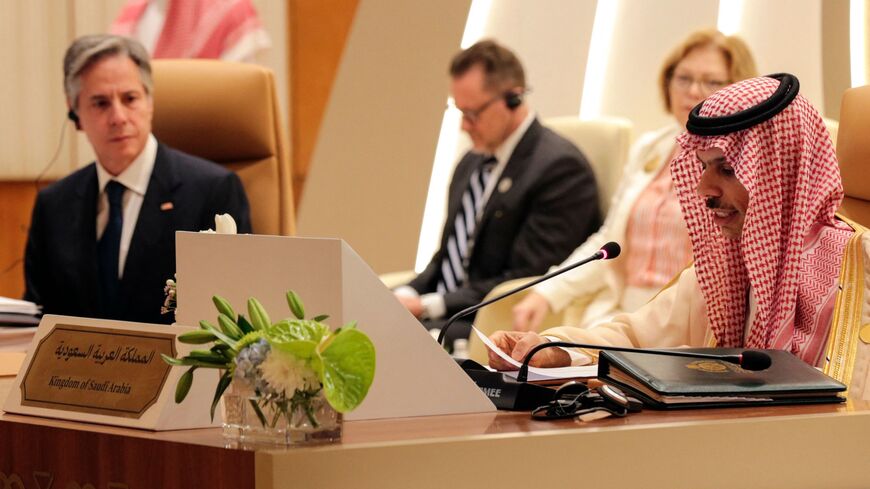Blinken: "It’s a strategic relationship"
US Secretary of State Antony Blinken didn’t hesitate when asked whether the US relationship with Saudi Arabia was transactional or strategic.
“It is a strategic relationship,” Blinken told Hiba Nasr of Asharq News. “I think what we’re seeing is an increasing convergence in our partnership to advance in issues of mutual interest to Saudi Arabia, to the United States, and, for that matter, to countries in the region and beyond.”
Blinken’s visit to the kingdom this week underscored a turnaround in a bilateral relationship that got off to a scratchy start when US President Joe Biden took office in January 2021. Candidate Biden had referred to the kingdom as a “pariah” because of the killing of Saudi columnist Jamal Khashoggi.
It didn’t take long for the administration to realize there is no workaround for dealing with Saudi Arabia, given its oil and economic power and convening authority — especially if ending the war in Yemen, strengthening regional deterrence against Iran and resolving the civil war in Sudan are US priorities, let alone trying to revive long-stalled Israeli-Palestinian negotiations.
This column praised Biden for his trip to the kingdom last year to put the relationship back on track. Despite a short blowup over the OPEC+ decision to cut production in October 2022, bilateral ties now are on more than solid ground, as Blinken and his Saudi counterpart, Foreign Minister Prince Faisal bin Farhan Al Saud, conveyed repeatedly in their public remarks.
On the economic front, Saudi investment in the United States, across industries, continues to grow, including tech and aerospace, as well as 5G/6G. While the kingdom is still making its money in the East, including oil sales to China and India, it is investing the lion's share in the West, and the United States in particular.
The positive vibes in Riyadh this past week reflect a partnership that is increasingly able to accommodate differences, including, for example, on Syria and Russia.
Blinken, in response to a question from Al-Monitor’s Elizabeth Hagedorn about normalization with Syria, said, “It’s no secret that we did not think that Syria merited readmission to the Arab League, but at the same time, we also see that we have the same goals when it comes to what we’re trying to achieve.”
Saudi Crown Prince and Prime Minister Mohammed bin Salman Al Saud spoke with Russian President Vladimir Putin soon after his meeting with Blinken on Tuesday, as Salim Essaid reports, reaffirming Saudi-Russian coordination on oil production and pricing within OPEC+. This is another point of friction where the United States has come to understand, perhaps groaningly, that Saudi collaboration with Russia on oil policy will be a fact of life as long as Riyadh and Moscow are the second- and third-largest global oil producers.
Meanwhile, the kingdom invited Ukrainian President Volodymyr Zelenskyy to participate in the Arab League summit last month in Jeddah.
The Saudi position on Russia, oil aside, is more bellwether than outlier in the way that much of the Middle East, Africa and Asia view the Ukraine war. Many world leaders manage to hold two thoughts that Washington and the West can’t seem to reconcile: Putin is the guilty party by his unprovoked invasion of Ukraine, and the war needs to end sooner rather than later, because of its economic, energy and other consequences around the world.
New normal on US-China-Saudi ties
Both Blinken and Saudi Foreign Minister Prince Faisal bin Farhan Al Saud downplayed American concerns about Saudi Arabia’s ties with China, as Elizabeth Hagedorn reports.
“I think that partnership has given us and China significant benefits and that cooperation is likely to grow,” Al Saud said. "We still have a robust security partnership with the US. That security partnership is refreshed on an almost daily basis."
“So I don’t ascribe to this zero-sum game,” he said.
China, of course, can’t compete with or dent the US-Saudi security relationship. It is no coincidence that combat aircraft from Israel, Jordan and the kingdom flew alongside US B1 bombers over the Middle East on Thursday in the Pentagon’s latest display of force directed at Iran, as Jared Szuba reports.
Blinken explained the US approach with regard to China is not asking anyone to choose, but rather “trying to demonstrate the benefits of our partnership and the affirmative agenda that we bring in what we’re trying to do.”
Blinken added that he “applauded” China’s role in closing the deal on Saudi Arabia and Iran, adding that “if countries — including China — can play a positive role wherever it is in helping to advance peace, to reduce tensions then, again, I think that’s positive.”
Nuclear energy new fault line for region
Saudi normalization with Israel, now referred to by the Biden administration as a national security interest for the United States, was also on Blinken’s agenda in the kingdom.
The price of normalization, as we reported here, has as much or more to do with Washington than Jerusalem: access to the most advanced weapons systems (on a par with Israel), a defense treaty and a US-Saudi civil nuclear cooperation agreement. Saudi Foreign Minister Al Saud added in Riyadh that any normalization deal will also need to address the longstanding Saudi support of a two-state solution on the Israeli-Palestinian conflict.
US civil nuclear agreements have to be approved by Congress. Because Riyadh is unlikely to agree to a zero enrichment deal, as the UAE has done, a US-Saudi agreement would be a tough if not impossible sell on Capitol Hill.
“If such a plan is being prepared, it will clearly exact a heavy price from Israel,” writes Ben Caspit. “[Israel Prime Minister Benjamin] Netanyahu would have to enlist congressional support for far-reaching concessions to the Saudis, including nuclear technology and uranium enrichment, and make concessions on the Palestinian issue. "
Despite the likely heavy lift, the United States is Saudi Arabia's partner of choice for a nuclear agreement.
“We would very much prefer to be able to have the US as one of the bidders for that program,“ said the foreign minister. “There are others that are bidding, and obviously we would like to build our program with the best technology in the world, and that will require a certain agreement to be in place. We have differences of opinion, so we’re working on finding a mechanism for us to be able to work together on civilian nuclear technology. But we intend to move forward on that program.”
Assuming China is one of the other bidders, the Biden administration can’t let Beijing seize the opening, given the stakes for nuclear proliferation in the region.
The goal of preventing an Iranian nuclear weapon, and deterring other countries from going nuclear, compelled the Obama administration to negotiate the Joint Comprehensive Plan of Action (JCPOA) in 2015.
Concerns about nuclear proliferation are back in play, more than ever, since the Trump administration withdrew from the JCPOA in 2018, and Iran has proved resistant to a new deal.
“If Iran gets an operational nuclear weapon, all bets are off,” Foreign Minister Al Saud said in December. “We are in a very dangerous space in the region. … You can expect that regional states will certainly look toward how they can ensure their own security.”
Iran is a civilian nuclear power and is already a weapons-threshold state. Saudi Arabia’s bid for its own civilian nuclear program, combined with a defense treaty and more advanced weapons sales, is as much about Iran as it is about Israel, and likely to become a defining issue in the US-Saudi security partnership.









